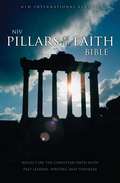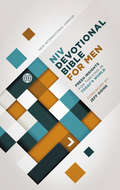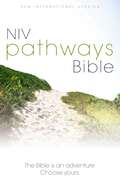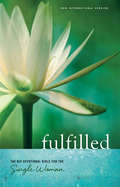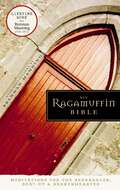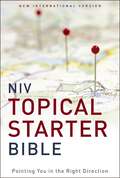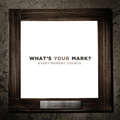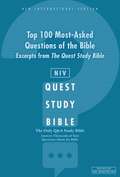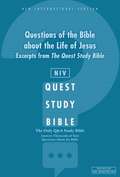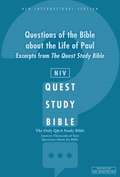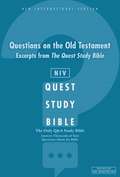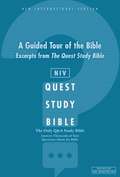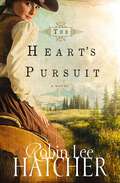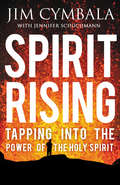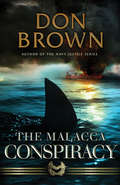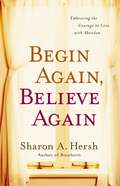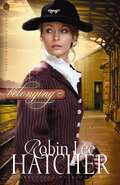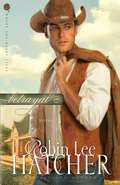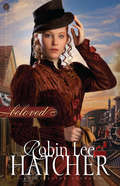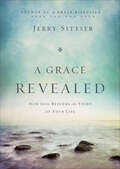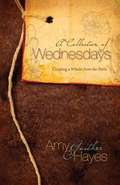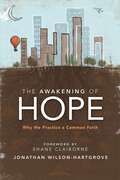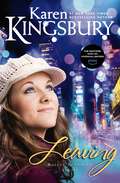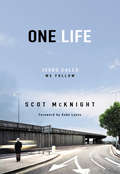- Table View
- List View
NIV, Pillars of the Faith, eBook
by ZondervanExplore the roots of your faith in the NIV Pillars of the Faith Bible. Inside this Bible you will find the New International Version Bible text paired with 26 pages of quotes and reflections from past Christian leaders, writers and thinkers, creating a profound, reflective experience. Features:• Complete text of the world’s most popular modern-English Bible, the NIV• Quotes and reflections from past Christian leaders, writers and thinkers• “Topical Study Index,” “30-second thought starters on authentic living” and “five minute reflections on the psalms”
NIV, Bible for Men, eBook: Fresh Insights for Thriving in Today's World
by Zondervan Jeff GoinsIn a world that tells us to be and live however we want, the NIV Bible for Men inspires you to be better, dig deeper into your soul, and do more with what God gave you. Spiritually challenging and always thought-provoking, each of the daily devotions will move you toward one goal: enriching your spiritual life and relationship with God every single day.Each reading begins with a tweetable statement that introduces you to that day’s meaningful, concise topic designed to address the challenges and expectations that will instantly connect with today’s guys, such as career, sexuality, leadership, pornography, relationships, financial stability, spiritual growth, substance addiction, culture, character, education, self-image and more. The NIV Bible for Men will help you to apply the Bible to your life every day. As you read and learn, this will quickly become your go-to Bible.NIV Bible for Men features include:260 weekday devotions from young pastors and leaders such as Matt Chandler, Shane Claiborne, Craig Gross, and Gabe Lyons2 methods to engage: reading through the Bible canonically from Genesis to Revelation or by topic using the topical index52 ”Myth Articles” state commonly accepted myths in our culture today, then refute those myths with answers from God’s Word.
NIV, Pathways Bible, eBook
by ZondervanRemember as a kid how fun it was to read a book in which you could choose your own adventure? The paths were endless; every page offered a new discovery. While the Bible is one unchanging story comprised of many smaller stories, it doesn't mean you have to read it the same way every time. Often it's hard to know where to start: which path is best for me? The NIV Pathways Bible offers you multiple ways to enter into God's Word. Maybe you want to spend 30 days getting to better know Jesus. Or maybe you want to read the more obscure parts of the Bible—the not-so-famous stories. There are 20 of them provided for you. Have you ever thought about reading through the entire Bible in a year? A reading plan for doing so is in this Bible too. And if that seems too intimidating, try the 60-day overview of the Bible. The NIV Pathways Bible has so many options that you'll find fresh new ways to enter into God's Word . . . so that his Word can enter into you.
Fulfilled: The NIV Devotional Bible for the Single Woman
by Mary HollingsworthAlone with God provides what no other devotional Bible product can deliver--the full text of the NIV Bible paired with the heartfelt, practical, entertaining, and inspiring biblical insite from well-known Christian single women who understand the unique challenges of living a joyful life without a soul mate.?
NIV Ragamuffin Bible: Meditations for the Bedraggled, Beat-Up, and Brokenhearted
by Brennan ManningDo you believe that God not only loves you, but that he also likes you? It's just one of the soul-searching questions posed by bestselling author Brennan Manning who confesses he has been "John the beloved, Peter the coward, and Thomas the doubter all before the waitress brought the check." The NIV Ragamuffin Bible offers a collection of Manning’s raw, painfully honest, yet grace-filled devotions, meditations, and reflections of his journey limping back to—like the prodigal son—his overjoyed father. When you journey through this Bible, you will likewise find yourself returning to your Heavenly Father, basking in the knowledge that God not only loves you, he delights in you. Features:• Complete text of the world’s most popular modern-English Bible, the NIV• 104 Devotions guide you into a deeper connection to God and his Word • 250 Reflections help you understand what it means to be a child of God• 150 Quotes offer short but thoughtful insights into God’s kingdom
NIV, Topical Starter Bible, eBook
by ZondervanThis Bible is your GPS for a tour through the Bible.Sometimes you want to meander through your Scripture reading, and other times you want to get straight to what you’re looking for. When it’s the latter, this is the Bible for you.The NIV Topical Starter Bible puts a spotlight on a variety of important topics, making it easy for you to find the answers you’re looking for. Got a hot topic on the mind? Find it in the 700+ entry topical index in the back of this Bible. Wondering if the Bible has anything to say about the hard question your friend asked you? Search the index to find the answer.
What’s Your Mark?
by Jeremy CowartWho was Jesus? What was his story? What mark did he leave? What's your story? What will be your mark?Join celebrity photographer and social artist Jeremy Cowart as he presents 16 compelling stories of people who are making their mark today. Their stories are just a sampling of the stories that all followers of Jesus can tell—stories from those in all walks of life whose inspiration is rooted in the truths found in the Gospel of Mark. And you’ll be inspired to make your mark—whether through your occupation, your talents or your selfless love and giving to others. Your mark may be teaching children at a school or at home, helping the homeless, or providing food to the hungry. Your mark might be an accidental mark, a reluctant mark, or an intentional mark. Whatever your mark, you’ll be inspired by the stories inside this new ebook What’s Your Mark?Become a mark-maker today, and make every moment of your life count.This ebook includes:• 112 full-color pages of Scripture, stories, and photography by renowned photographer Jeremy Cowart• 16 photos and stories of people—some names you’ll recognize, others not so well known—making their mark• Scripture text of the Gospel of Mark from the bestselling New International Version (NIV) Bible
Top 100 Q and A of the Bible: The Question and Answer Bible
by ZondervanPassages that once puzzled you become clear as you explore God's word and uncover the meaning of Scripture. This digital extract edition is designed to address the top 100 common, uncommon, and perplexing questions people ask about Scripture. "Is there more to the Gospel than being assured of heaven?" "Does the Bible have answers for all of today's moral dilemmas?" "Why does God allow bad things to happen? While it does not contain the full Bible it does contain all the verses associated with the top 100 questions & answers Bible reading plan.
Q and A on the Life of Jesus: The Question and Answer Bible
by ZondervanThis unique Zondervan Bible Extract is one of three courses taking you quickly into passages every Christian should know. In this bite size edition you’ll spend two weeks studying the life and teachings of Jesus from passages in Matthew, Mark, Luke, and John. Each daily reading should take only about 10 minutes. There are 14 chapters of scripture included. This digital extract edition is designed to address common, uncommon, and perplexing questions people ask about Scripture. "Why was the Birth of Jesus announced to Shepherds?" "What does it mean to take up one's cross?" "How can we do greater things than Jesus did?" While it does not contain the full Bible it does contain all the verses associated with the Q&A on the Life of Jesus reading plan.
Q and A on the Life of Paul: The Question and Answer Bible
by ZondervanThis unique Zondervan Bible Extract is one of three courses taking you quickly into passages every Christian should know. In this bite size edition you’ll spend two weeks studying the life and teachings of Paul from passages in Acts, Romans, 1 Corinthians, Galatians, Ephesians, and Philippians. Each daily reading should take only about 10 minutes. There are 14 chapters of scripture included. You’ll also find question-based notes that clarify the meaning of the Bible text. "Do all bad events have a good purpose?" "When is a person old enough to make a decision to believe in Jesus?" "How do we develop the Fruit of the Spirit? While it does not contain the full Bible it does contain all the verses associated with the Q&A on the Life of Paul reading plan.
Q and A on the Old Testament: The Question and Answer Bible
by ZondervanThis unique Zondervan Bible Extract is one of three courses taking you quickly into passages every Christian should know. In this bite size edition you’ll spend two weeks in the Old Testament studying passages from Genesis, Exodus, 1 & 2 Samuel, 1 Kings, Job, Psalms, Isaiah, Daniel, and Amos. Each daily reading should take only about 10 minutes. There are 14 chapters of scripture included. You’ll also find question-based notes that clarify the meaning of the Bible text. "Would God ever ask us to do wrong?" "Who is God, what does He value, and how can we approach Him?" "How can God be both a powerful ruler and a gentle shepherd?" While it does not contain the full Bible it does contain all the verses associated with the Q&A on the Old Testament reading plan.
Q and A Guided Tour of the Bible: The Question and Answer Bible
by ZondervanThis unique Zondervan Bible Extract offers daily readings consisting of 180 selected passages, including at least one chapter from each of the Bible’s 66 books. You can read both the chapter and its accompanying question-based notes that clarify the meaning of the Bible text in 15 minutes per day. With a few exceptions, the Biblical material appears in chronological order. You will read the psalms attributed to David as you read about David’s life. You will read the prophets along with their background history. Portions from the Gospels, too, are interspersed, giving a composite picture of Jesus’ life on earth; Paul’s letters are scattered throughout the record of Jesus’ life.
The Heart's Pursuit
by Robin Lee HatcherA Colorado beauty abandoned at the altar. A rugged bounty hunter haunted by his past. In this dramatic historical novel by best-selling author Robin Lee Hatcher, two wounded hearts join forces in a pursuit across the Old West. Silver Matlock is a Colorado beauty in search of revenge against the man who stranded her at the altar and fled with the remnant of her family's fortune. She is determined to find the man who betrayed her trust. Jared Newman, rugged as the West itself, is relentless in his pursuit of lawless men—but unable to escape his own tragic past. Hardened by his life as a bounty hunter, he must learn to forgive before he loses his soul. Joining forces, the two set out in search of Silver's betrayer. The handsome but embittered Jared finds himself powerfully drawn to the beautiful woman whose drive for justice equals his own. But lack of honesty keeps Silver and Jared from fully trusting each other, even as a shocking revelation intensifies their pursuit of the cunning—and deadly—quarry. "Hatcher delivers another thought-provoking historical novel." —CBA Retailers + Resources
Spirit Rising: Tapping into the Power of the Holy Spirit
by Jim Cymbala Jennifer SchuchmannFor some of us being a Christian is harder than it should be. Discouraged, anxious, worn down, we wonder what happened to the power and the joy that Jesus promised. Jim Cymbala believes that many of us are missing something vital. Christianity, he says, for even the best-intentioned person or church, is impossible without the Holy Spirit. You can have regular devotions, great preaching, a strong emphasis on the Bible, a great worship team, and a congregation that is trying, but if you aren’t vitally in touch with God’s Spirit, you are missing out on the life God has for you. The Holy Spirit, he points out, is God’s agent on earth. Yet he is the least understood, least preached about, and least discussed member of the Trinity. That is sad, because without him, our spiritual lives will always become dry, mechanical, and a struggle. Too often, the body of Christ is divided into two sides. One side stresses the Word of God, separating itself from what it views as the emotional fanaticism often linked to those emphasizing the Holy Spirit. The other side is sometimes known for drifting into unbiblical manifestations and unorthodox teaching while attributing it all to the Spirit of God. But the Christianity we see in Scripture is both grounded in the Word and full of the Spirit. With stunning stories of how God is working in the lives of people and churches today and biblical teaching about the Holy Spirit, Jim Cymbala invites you to experience God in a fresh and vital way. Nothing else will change our prayer life, our study of God’s word, and our worship more than opening our hearts to the Spirit. If we want power, confidence, joy, peace, and more love in our lives, then we need a better understanding of how and why the Spirit moves so we can join him there.
The Malacca Conspiracy
by Don BrownSet in Singapore, Indonesia, Malaysia, and the United States, The Malacca Conspiracy is a bone-chilling tale of terrorism on the high seas, of political assassination and nuclear brinkmanship. And for Zack and Diane—your favorite JAG characters from Don Brown’s popular Navy Justice Series—a story of hope for a longstanding romance that is now or never. When a dastardly plot is hatched in the Malaysian seaport of Malacca to attack civilian oil tankers at sea, to drive up the price of crude oil futures, and to assassinate the Indonesian president and use fat windfall profits to finance a nuclear attack against American cities, Navy JAG officers Zack Brewer and Diane Cocernian reunite in a sizzling race against the clock to foil the conspiracy before disaster strikes. But as President Mack Williams sends ships of the U.S. Seventh Fleet towards the Malacca Straights to reassert control over the sea lanes, will Navy JAG officers Zack Brewer and Diane Colcernian survive this dangerous and final high-stakes drama of life and death? You won’t be able to put this thriller down until you find out.
Begin Again, Believe Again: Embracing the Courage to Love with Abandon
by Sharon A. HershOur hearts as women were made by God for relationships. Why is it, then, that the thing we most deeply desire—relationships—becomes the source of so much pain? Difficult marriages, the loneliness of being single, problem children, abusive employers, fractured friendships...life's realities are often very different from the dreams we dreamed for ourselves as girls. How do we live with this beautiful ache for relationships in a world that doesn't always work? When we've been betrayed, how do we trust again? When we've been disappointed, how do we hope again? When we've been terribly hurt, how do we love again? In this honest, intimate, and transformative book, counselor Sharon Hersh helps you gain a new, truly biblical perspective on relationships that can help you endure the heartaches and still come up living wholeheartedly, loving with abandon, and daring to hope and believe. The stories of the women in this book, including that of the author, are signposts that point you beyond the sometimes devastating problems of life to the deep, rich reason and root of all relationships, both good and bad: God's desire for relationship with you. In Sharon's words, “Relationships are not the destination—they are the path to something more.”
Belonging: A Novel (Where The Heart Lives #1)
by Robin Lee HatcherIn the high desert town of Frenchman’s Bluff, Idaho, Felicia Kristoffersen has set out to create a future for herself that is better than her painful past. Alone in the world with only her faith to sustain her, she must prove herself as this tiny community’s new school teacher. She cannot, must not, fail. But, there are those who never wanted her there to begin with. Five years after the death of his wife, local merchant Colin Murphy cares about just one thing: raising his daughter, Charity. Colin wants to give her the educational advantages he never had. The new schoolmarm’s inexperience doesn’t sit well with him, and if this teacher up and marries like the last one did, Charity’s heart will be broken once again. A woman who hasn’t known love. A man who lost the love he had. In the midst of the wide, sage-covered plains, each is about to discover that life’s bitterest circumstances truly can work together for good. Tender, evocative, and beautifully written, Belonging is a journey about love after loss, and about two hearts destined to become one—despite their stubbornness! Belonging is Robin Lee Hatcher at her best! —Tamera Alexander, bestselling author of Within My Heart and The Inheritance Belonging is vintage Robin Lee Hatcher: a touching, tender love story, filled with genuine conflict and characters that quietly build a nest in your heart. A skillful blend of description, emotion, and spiritual reflection, Belonging will sweep you away to late nineteenth-century Idaho, glad to have a seasoned novelist driving your buckboard wagon with a sure hand. By story's end you'll no doubt sigh with relief, smile with delight, and turn back to page one for a second visit with our determined Miss K. Loved it!" — Liz Curtis Higgs, New York Times bestselling author of Mine Is the Night
Betrayal: A Novel
by Robin Lee HatcherIt’s the turn of the twentieth century and drifter Hugh Brennan is a man well acquainted with betrayal. Hugh finds himself drawn to the attractive widow, Julia, yet when he looks into her eyes, he recognizes the same hurt that haunts him. Julia Grace has little reason to trust men, but she’s going to have to trust someone if she’s to keep her ranch from the clutches of her dead husband’s half-brother. Is it possible God had a hand in bringing Hugh to her door? The latest historical romance from award-winning author Robin Lee Hatcher and the second book in the Where the Heart Lives series, Betrayal will take you to the high desert of western Wyoming, through the crags of the Rocky Mountains, and into the hearts of two seekers learning to trust God’s love no matter the circumstances.
Beloved
by Robin Lee HatcherA most unwelcome guest surprises Diana at her engagement party—the husband she thought was dead! Diana Brennan came west on the orphan train and was given a home with a loving couple who cherished and spoiled her. At 17, she fell hard for Tyson Applegate, the son of a wealthy mine owner. After a whirlwind courtship and marriage, Tyson took o for adventures around the world, including fighting with the Rough Riders in Cuba. Receiving no word of him in years, Diana is ready to move past the old pain and marry again, just as soon as Tyson is declared legally dead. But when Tyson returns, supposedly a changed man, he wants to reunite with his wife and run for the senate. While Diana suspects the election is his real reason for wanting her by his side, she agrees to maintain his home and to campaign with him, but when it is over, win or lose, she wants her freedom. He agrees with one condition—she must give him a chance to change her mind about him.
A Grace Revealed: How God Redeems the Story of Your Life
by Jerry SittserTwenty years ago, Jerry Sittser lost his daughter, wife, and mother in a car accident. He chronicled that tragic experience in A Grace Disguised, a book that has become a classic on the topic of grief and loss.Now he asks: How do we live meaningfully, even fruitfully, in this world and at the same time long for heaven? How do we respond to the paradox of being a new creature in Christ even though we don’t always feel or act like one? How can we trust God is involved in our story when our circumstances seem to say he isn’t?While A Grace Disguised explored how the soul grows through loss, A Grace Revealed brings the story of Sittser’s family full circle, revealing God’s redeeming work in the midst of circumstances that could easily have destroyed them. As Sittser reminds us, our lives tell a good story after all. A Grace Revealed will helps us understand and trust that God is writing a beautiful story in our own lives.
A Collection Of Wednesdays: Creating a Whole from the Parts
by Amy Gaither HayesIf you were to set aside a part of one day every week to explore all the pieces of who you are, what would you find? For Amy Gaither Hayes, Wednesday mornings have been such a time: a sacred space for her to distill the seemingly disparate bits and pieces of her life into their essence. Then she has set about reconnecting those pieces like beads in a necklace, discovering in the process a unified whole infused with purpose and beauty by her Creator. So it is with us all. In this anthology of Wednesday reflections by Amy, you will discover a new, simpler way of looking at the person you are. Through story, poetry, and song lyrics, A Collection of Wednesdays helps you uncover a Divinely woven order in what appear to be the random components of your life. Calling. Passion. Sand. Rest. Church. Music. Books. Words such as these offer fresh, uplifting glimpses of how your soul is put together. Find out how, and discover new insights into both yourself and the heart and ways of God.
The Awakening of Hope: Why We Practice a Common Faith
by Shane Claiborne Jonathan Wilson-HartgroveAccording to Jonathan Wilson-Hartgrove, faithful action is always inspired and sustained by common convictions—the basic truths that have sustained God’s people throughout every generation. The Awakening of Hope re-presents Christian faith by beginning with stories of faithful witness and asking, Why? Why do Christians eat together? Why do we fast? Why would we rather die than kill? These are the questions that help us see why creation and the fall, covenant and community, ethics and evangelism matter. This book and its accompanying DVD project is a contemporary catechism, celebrating lives and stories that wouldn’t make sense if the gospel were not true. And then going one step further, this project shares the good news of Jesus and the way of life that he makes possible.
Leaving (The Baxters—Bailey Flanigan #No. 1)
by Karen KingsburyA small-town girl finally has her chance at becoming an actress on Broadway--but can she really give up everything she's ever known?Bailey Flanigan is finally leaving her small-town home of Bloomington, Indiana, for the adventure of a lifetime: she has gotten a part in a Broadway musical in New York City. She's determined to take advantage of this unbelievable opportunity, but is she really ready to leave family and friends for the loneliness of the big city? And what about Cody, her former boyfriend? His disappearance has her worried about their future and praying that their love can survive.Cody has been struggling with his own problems. In order to be closer to his mother, who's in prison for a drug charge, Cody takes a coaching job in a small community outside Indianapolis. New friends, distance, and circumstances expose cracks in his relationship with Bailey.Love, loneliness, big opportunities, and even bigger decisions put these two young people to the test in the first book in the Bailey Flanigan series. Features members of the popular Baxter family from New York Times bestselling author Karen Kingsbury's beloved Redemption series, now streaming onlineSweet, contemporary Christian romanceThe first installment of The Baxters--Bailey Flanigan series Book 1: LeavingBook 2: LearningBook 3: LongingBook 4: LovingIncludes discussion questions for book clubs
Unlocked: A Love Story
by Karen KingsburyBefore You Take a Stand … You Got to Take a Chance. Holden Harris is an eighteen-year-old locked in a prison of autism. Despite his quiet ways and quirky behaviors, Holden is very happy and socially normal—on the inside, in a private world all his own. In reality, he is bullied at school by kids who only see that he is very different. Ella Reynolds is part of the “in” crowd. A cheerleader and star of the high school drama production, her life seems perfect. When she catches Holden listening to her rehearse for the school play, she is drawn to him … the way he is drawn to the music. Then, Ella makes a dramatic discovery—she and Holden were best friends as children. Frustrated by the way Holden is bullied, and horrified at the indifference of her peers, Ella decides to take a stand against the most privileged and popular kids at school. Including her boyfriend, Jake. Ella believes miracles can happen in the unlikeliest places, and that just maybe an entire community might celebrate from the sidelines. But will Holden’s praying mother and the efforts of Ella and a cast of theater kids be enough to unlock the prison that contains Holden? This time, friendship, faith, and the power of a song must be strong enough to open the doors to the miracle Holden needs.
One.Life: Jesus Calls, We Follow
by Scot Mcknight Gabe LyonsWhat is the “Christian life” all about? Studying the Bible, attending church, cultivating a prayer life, witnessing to others—those are all good. But is that really what Jesus has in mind? The answer, says Scot McKnight in One.Life, lies in Jesus’ words, “Follow me.” What does it look like to follow Jesus, and how will doing so change the way we live our life—our love.life, our justice.life, our peace.life, our community.life, our sex.life—everything about our life. One.Life will open your eyes to the full, compelling immensity of what it means to be a Christian. “Jesus offers to us a kingdom dream that transforms us to the very core of our being,” says Scot McKnight. “His vision is so big we are called to give our entire life to it. His vision is so big it swallows up our dreams.” Discover exactly what Jesus meant when he announced the arrival of God’s kingdom. Equipping you with a new understanding of that kingdom’s radical nature, One.Life shares profound, challenging, and practical insights on how to demonstrate its reality in your life. In many ways, what The Cost of Discipleship by Bonhoeffer challenged Christians to do in earlier generations, One.Life will do for a new generation. One.Life will call you beyond the flatlands of religiosity toward a kingdom vision that will shape everything you do.
